BMS501: Personal SWOT Analysis and Career Development Plan
VerifiedAdded on 2023/06/15
|10
|2722
|390
Report
AI Summary
This report presents a reflective analysis of an individual's strengths, weaknesses, opportunities, and threats (SWOT) to inform career development planning. It includes a skills audit identifying gaps and future training needs, as well as outlining short, medium, and long-term career goals. The report discusses potential career prospects and progression opportunities, highlighting the importance of networking, training, and mentoring. It also addresses potential barriers to career advancement, such as lack of direction and fear of failure. The analysis aims to provide a roadmap for achieving professional objectives by leveraging strengths and addressing weaknesses.
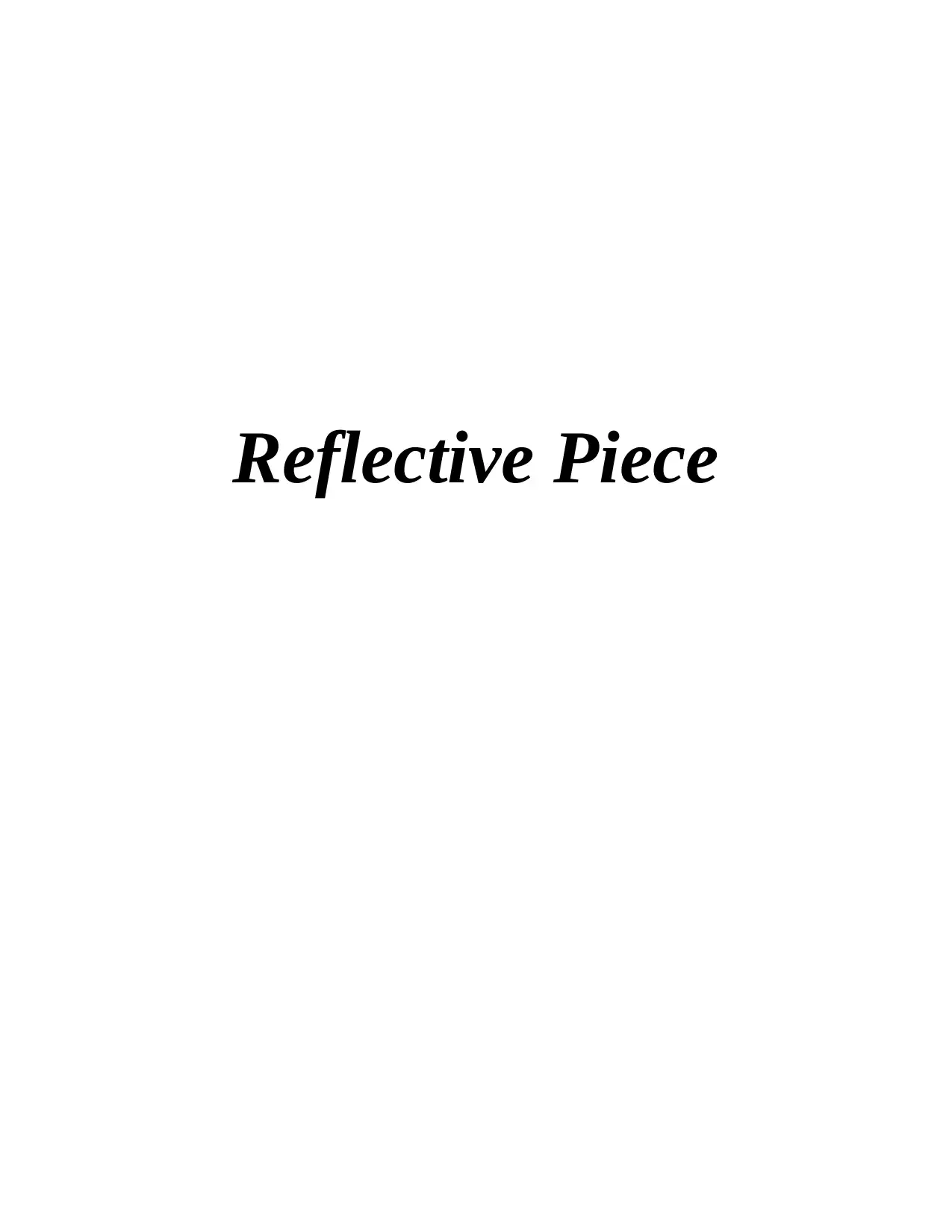
Reflective Piece
Paraphrase This Document
Need a fresh take? Get an instant paraphrase of this document with our AI Paraphraser
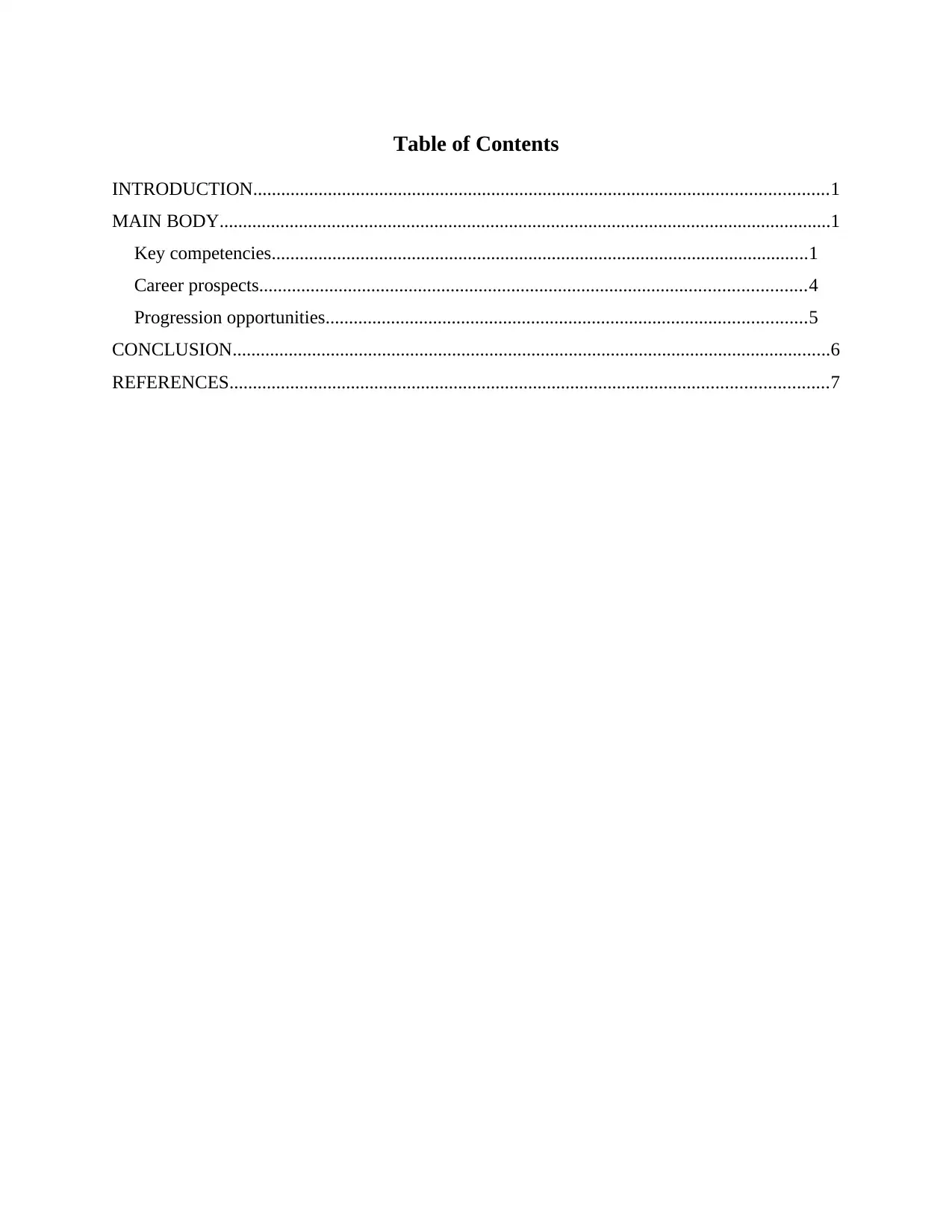
Table of Contents
INTRODUCTION...........................................................................................................................1
MAIN BODY...................................................................................................................................1
Key competencies...................................................................................................................1
Career prospects.....................................................................................................................4
Progression opportunities.......................................................................................................5
CONCLUSION................................................................................................................................6
REFERENCES................................................................................................................................7
INTRODUCTION...........................................................................................................................1
MAIN BODY...................................................................................................................................1
Key competencies...................................................................................................................1
Career prospects.....................................................................................................................4
Progression opportunities.......................................................................................................5
CONCLUSION................................................................................................................................6
REFERENCES................................................................................................................................7
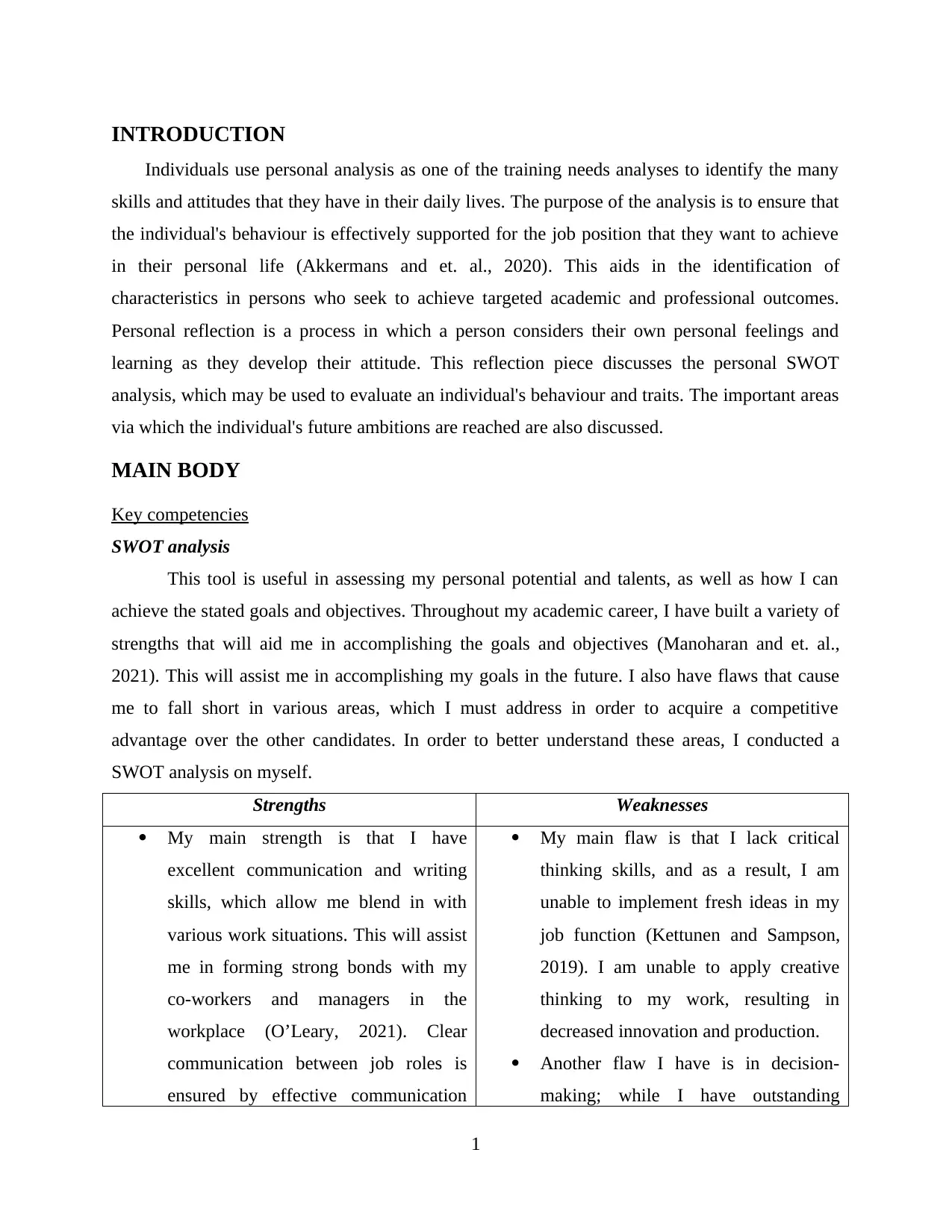
INTRODUCTION
Individuals use personal analysis as one of the training needs analyses to identify the many
skills and attitudes that they have in their daily lives. The purpose of the analysis is to ensure that
the individual's behaviour is effectively supported for the job position that they want to achieve
in their personal life (Akkermans and et. al., 2020). This aids in the identification of
characteristics in persons who seek to achieve targeted academic and professional outcomes.
Personal reflection is a process in which a person considers their own personal feelings and
learning as they develop their attitude. This reflection piece discusses the personal SWOT
analysis, which may be used to evaluate an individual's behaviour and traits. The important areas
via which the individual's future ambitions are reached are also discussed.
MAIN BODY
Key competencies
SWOT analysis
This tool is useful in assessing my personal potential and talents, as well as how I can
achieve the stated goals and objectives. Throughout my academic career, I have built a variety of
strengths that will aid me in accomplishing the goals and objectives (Manoharan and et. al.,
2021). This will assist me in accomplishing my goals in the future. I also have flaws that cause
me to fall short in various areas, which I must address in order to acquire a competitive
advantage over the other candidates. In order to better understand these areas, I conducted a
SWOT analysis on myself.
Strengths Weaknesses
My main strength is that I have
excellent communication and writing
skills, which allow me blend in with
various work situations. This will assist
me in forming strong bonds with my
co-workers and managers in the
workplace (O’Leary, 2021). Clear
communication between job roles is
ensured by effective communication
My main flaw is that I lack critical
thinking skills, and as a result, I am
unable to implement fresh ideas in my
job function (Kettunen and Sampson,
2019). I am unable to apply creative
thinking to my work, resulting in
decreased innovation and production.
Another flaw I have is in decision-
making; while I have outstanding
1
Individuals use personal analysis as one of the training needs analyses to identify the many
skills and attitudes that they have in their daily lives. The purpose of the analysis is to ensure that
the individual's behaviour is effectively supported for the job position that they want to achieve
in their personal life (Akkermans and et. al., 2020). This aids in the identification of
characteristics in persons who seek to achieve targeted academic and professional outcomes.
Personal reflection is a process in which a person considers their own personal feelings and
learning as they develop their attitude. This reflection piece discusses the personal SWOT
analysis, which may be used to evaluate an individual's behaviour and traits. The important areas
via which the individual's future ambitions are reached are also discussed.
MAIN BODY
Key competencies
SWOT analysis
This tool is useful in assessing my personal potential and talents, as well as how I can
achieve the stated goals and objectives. Throughout my academic career, I have built a variety of
strengths that will aid me in accomplishing the goals and objectives (Manoharan and et. al.,
2021). This will assist me in accomplishing my goals in the future. I also have flaws that cause
me to fall short in various areas, which I must address in order to acquire a competitive
advantage over the other candidates. In order to better understand these areas, I conducted a
SWOT analysis on myself.
Strengths Weaknesses
My main strength is that I have
excellent communication and writing
skills, which allow me blend in with
various work situations. This will assist
me in forming strong bonds with my
co-workers and managers in the
workplace (O’Leary, 2021). Clear
communication between job roles is
ensured by effective communication
My main flaw is that I lack critical
thinking skills, and as a result, I am
unable to implement fresh ideas in my
job function (Kettunen and Sampson,
2019). I am unable to apply creative
thinking to my work, resulting in
decreased innovation and production.
Another flaw I have is in decision-
making; while I have outstanding
1
⊘ This is a preview!⊘
Do you want full access?
Subscribe today to unlock all pages.

Trusted by 1+ million students worldwide
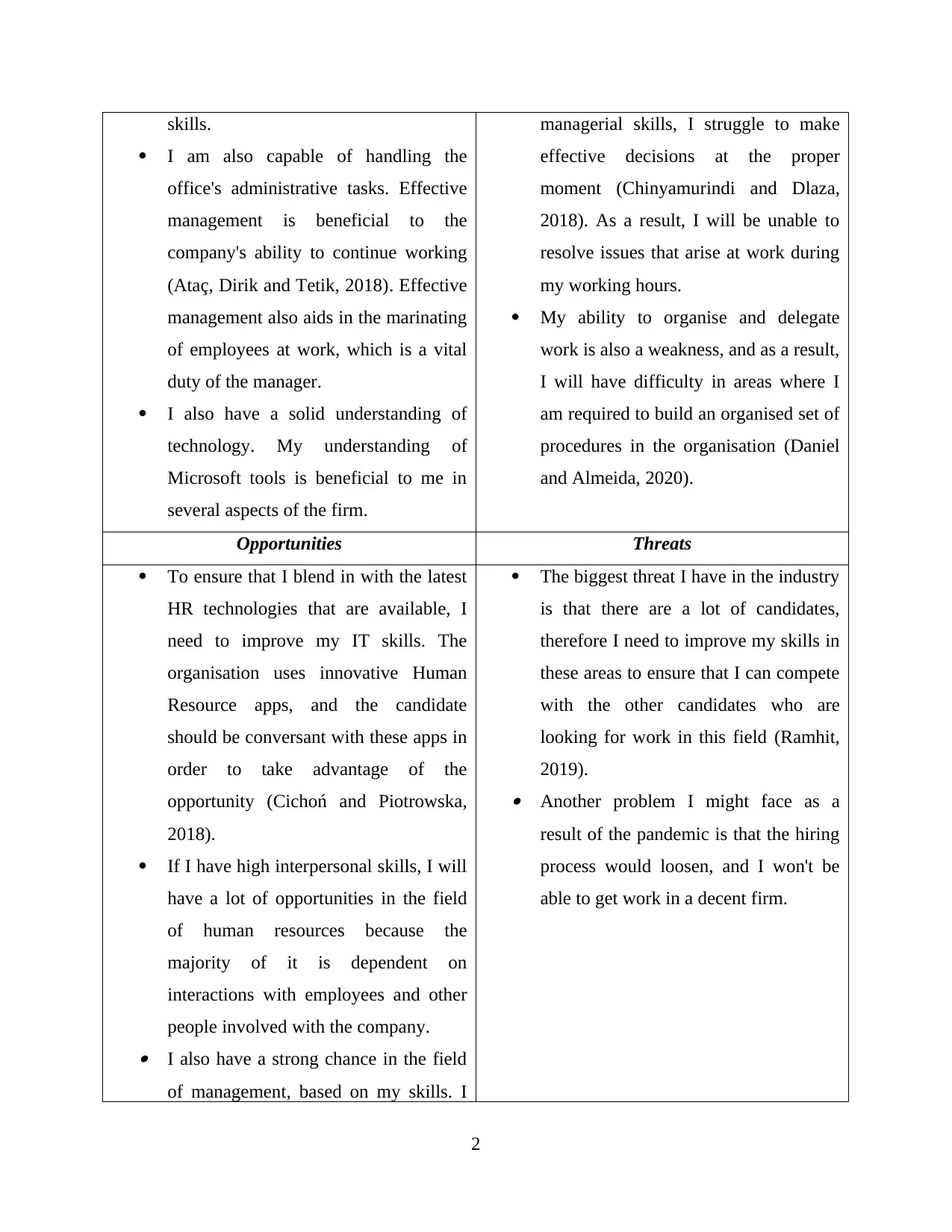
skills.
I am also capable of handling the
office's administrative tasks. Effective
management is beneficial to the
company's ability to continue working
(Ataç, Dirik and Tetik, 2018). Effective
management also aids in the marinating
of employees at work, which is a vital
duty of the manager.
I also have a solid understanding of
technology. My understanding of
Microsoft tools is beneficial to me in
several aspects of the firm.
managerial skills, I struggle to make
effective decisions at the proper
moment (Chinyamurindi and Dlaza,
2018). As a result, I will be unable to
resolve issues that arise at work during
my working hours.
My ability to organise and delegate
work is also a weakness, and as a result,
I will have difficulty in areas where I
am required to build an organised set of
procedures in the organisation (Daniel
and Almeida, 2020).
Opportunities Threats
To ensure that I blend in with the latest
HR technologies that are available, I
need to improve my IT skills. The
organisation uses innovative Human
Resource apps, and the candidate
should be conversant with these apps in
order to take advantage of the
opportunity (Cichoń and Piotrowska,
2018).
If I have high interpersonal skills, I will
have a lot of opportunities in the field
of human resources because the
majority of it is dependent on
interactions with employees and other
people involved with the company. I also have a strong chance in the field
of management, based on my skills. I
The biggest threat I have in the industry
is that there are a lot of candidates,
therefore I need to improve my skills in
these areas to ensure that I can compete
with the other candidates who are
looking for work in this field (Ramhit,
2019).
Another problem I might face as a
result of the pandemic is that the hiring
process would loosen, and I won't be
able to get work in a decent firm.
2
I am also capable of handling the
office's administrative tasks. Effective
management is beneficial to the
company's ability to continue working
(Ataç, Dirik and Tetik, 2018). Effective
management also aids in the marinating
of employees at work, which is a vital
duty of the manager.
I also have a solid understanding of
technology. My understanding of
Microsoft tools is beneficial to me in
several aspects of the firm.
managerial skills, I struggle to make
effective decisions at the proper
moment (Chinyamurindi and Dlaza,
2018). As a result, I will be unable to
resolve issues that arise at work during
my working hours.
My ability to organise and delegate
work is also a weakness, and as a result,
I will have difficulty in areas where I
am required to build an organised set of
procedures in the organisation (Daniel
and Almeida, 2020).
Opportunities Threats
To ensure that I blend in with the latest
HR technologies that are available, I
need to improve my IT skills. The
organisation uses innovative Human
Resource apps, and the candidate
should be conversant with these apps in
order to take advantage of the
opportunity (Cichoń and Piotrowska,
2018).
If I have high interpersonal skills, I will
have a lot of opportunities in the field
of human resources because the
majority of it is dependent on
interactions with employees and other
people involved with the company. I also have a strong chance in the field
of management, based on my skills. I
The biggest threat I have in the industry
is that there are a lot of candidates,
therefore I need to improve my skills in
these areas to ensure that I can compete
with the other candidates who are
looking for work in this field (Ramhit,
2019).
Another problem I might face as a
result of the pandemic is that the hiring
process would loosen, and I won't be
able to get work in a decent firm.
2
Paraphrase This Document
Need a fresh take? Get an instant paraphrase of this document with our AI Paraphraser
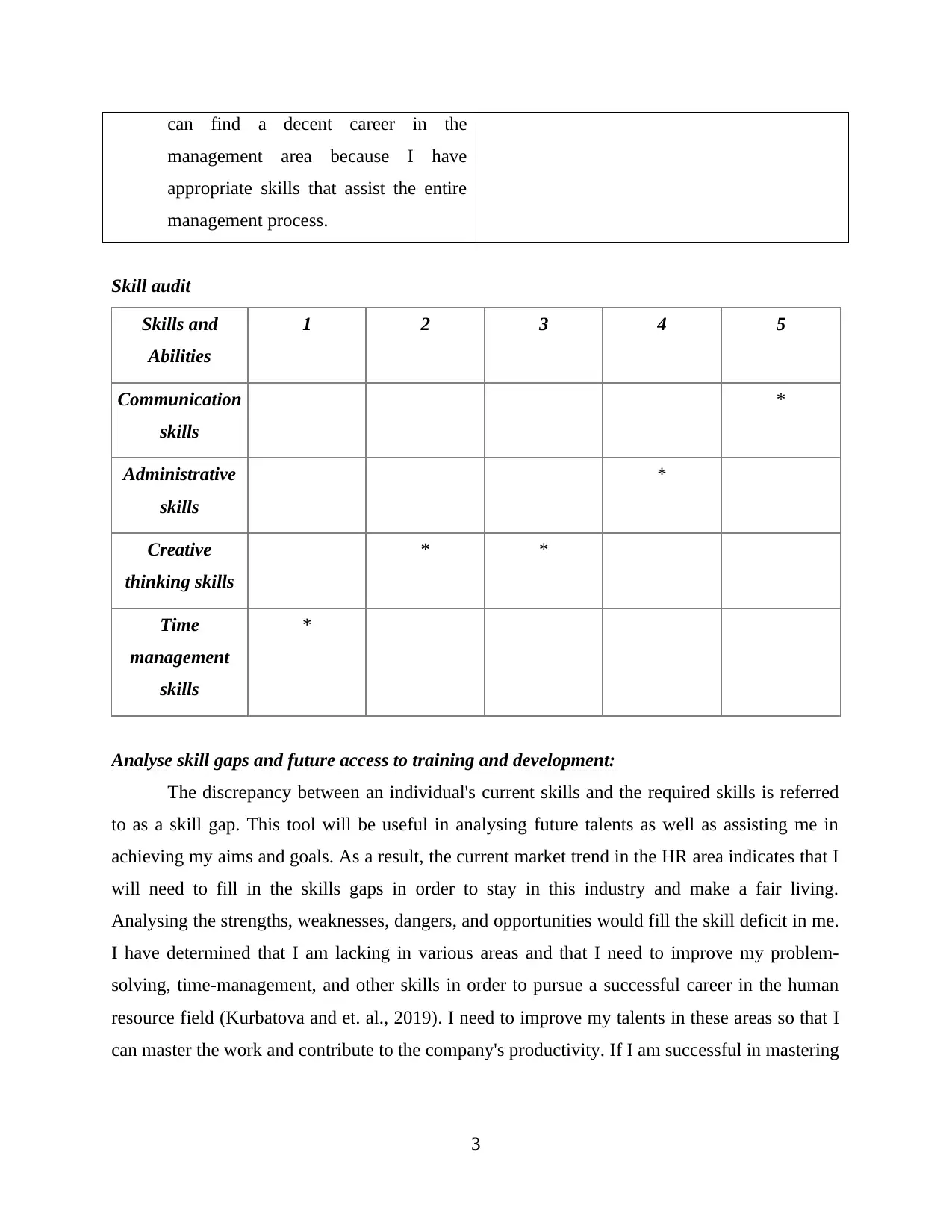
can find a decent career in the
management area because I have
appropriate skills that assist the entire
management process.
Skill audit
Skills and
Abilities
1 2 3 4 5
Communication
skills
*
Administrative
skills
*
Creative
thinking skills
* *
Time
management
skills
*
Analyse skill gaps and future access to training and development:
The discrepancy between an individual's current skills and the required skills is referred
to as a skill gap. This tool will be useful in analysing future talents as well as assisting me in
achieving my aims and goals. As a result, the current market trend in the HR area indicates that I
will need to fill in the skills gaps in order to stay in this industry and make a fair living.
Analysing the strengths, weaknesses, dangers, and opportunities would fill the skill deficit in me.
I have determined that I am lacking in various areas and that I need to improve my problem-
solving, time-management, and other skills in order to pursue a successful career in the human
resource field (Kurbatova and et. al., 2019). I need to improve my talents in these areas so that I
can master the work and contribute to the company's productivity. If I am successful in mastering
3
management area because I have
appropriate skills that assist the entire
management process.
Skill audit
Skills and
Abilities
1 2 3 4 5
Communication
skills
*
Administrative
skills
*
Creative
thinking skills
* *
Time
management
skills
*
Analyse skill gaps and future access to training and development:
The discrepancy between an individual's current skills and the required skills is referred
to as a skill gap. This tool will be useful in analysing future talents as well as assisting me in
achieving my aims and goals. As a result, the current market trend in the HR area indicates that I
will need to fill in the skills gaps in order to stay in this industry and make a fair living.
Analysing the strengths, weaknesses, dangers, and opportunities would fill the skill deficit in me.
I have determined that I am lacking in various areas and that I need to improve my problem-
solving, time-management, and other skills in order to pursue a successful career in the human
resource field (Kurbatova and et. al., 2019). I need to improve my talents in these areas so that I
can master the work and contribute to the company's productivity. If I am successful in mastering
3
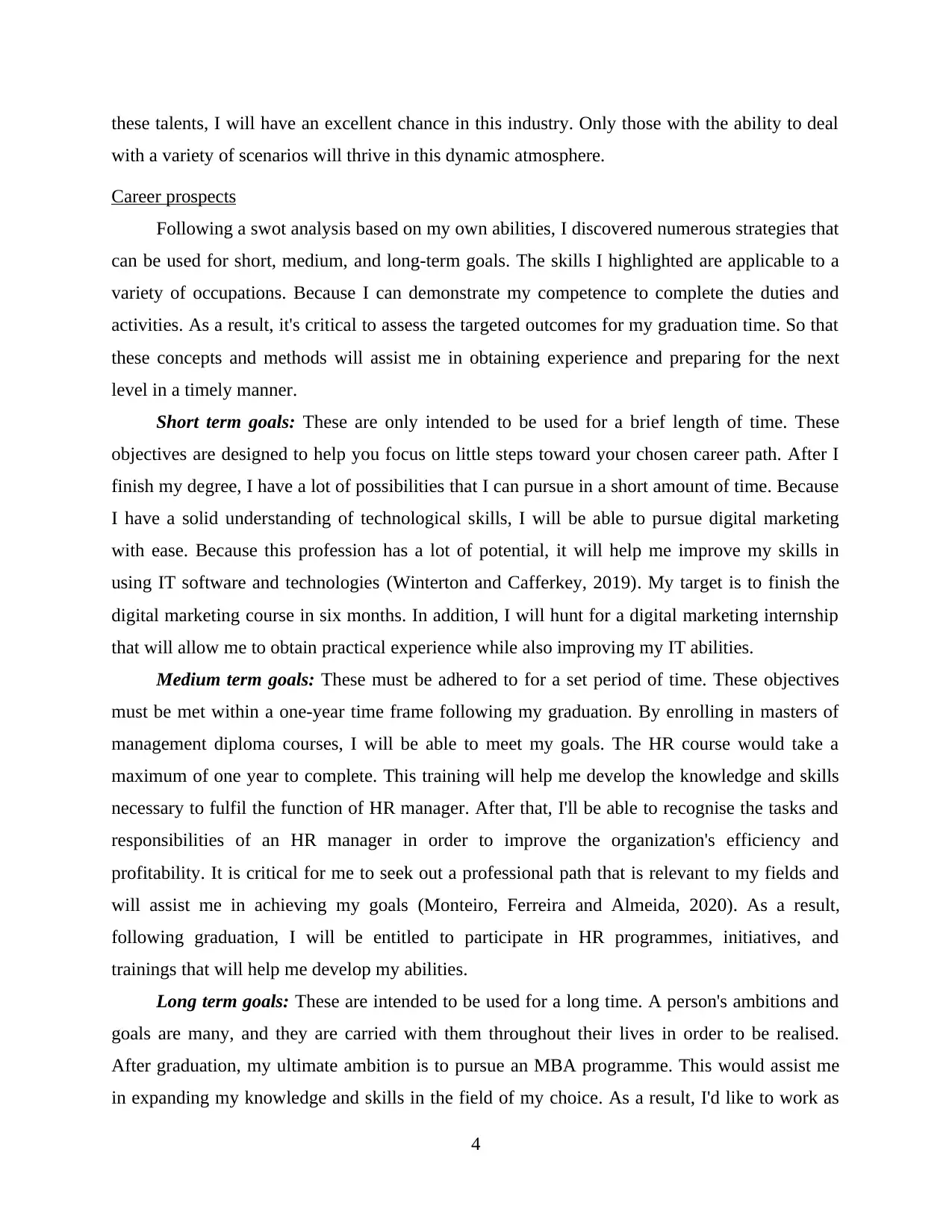
these talents, I will have an excellent chance in this industry. Only those with the ability to deal
with a variety of scenarios will thrive in this dynamic atmosphere.
Career prospects
Following a swot analysis based on my own abilities, I discovered numerous strategies that
can be used for short, medium, and long-term goals. The skills I highlighted are applicable to a
variety of occupations. Because I can demonstrate my competence to complete the duties and
activities. As a result, it's critical to assess the targeted outcomes for my graduation time. So that
these concepts and methods will assist me in obtaining experience and preparing for the next
level in a timely manner.
Short term goals: These are only intended to be used for a brief length of time. These
objectives are designed to help you focus on little steps toward your chosen career path. After I
finish my degree, I have a lot of possibilities that I can pursue in a short amount of time. Because
I have a solid understanding of technological skills, I will be able to pursue digital marketing
with ease. Because this profession has a lot of potential, it will help me improve my skills in
using IT software and technologies (Winterton and Cafferkey, 2019). My target is to finish the
digital marketing course in six months. In addition, I will hunt for a digital marketing internship
that will allow me to obtain practical experience while also improving my IT abilities.
Medium term goals: These must be adhered to for a set period of time. These objectives
must be met within a one-year time frame following my graduation. By enrolling in masters of
management diploma courses, I will be able to meet my goals. The HR course would take a
maximum of one year to complete. This training will help me develop the knowledge and skills
necessary to fulfil the function of HR manager. After that, I'll be able to recognise the tasks and
responsibilities of an HR manager in order to improve the organization's efficiency and
profitability. It is critical for me to seek out a professional path that is relevant to my fields and
will assist me in achieving my goals (Monteiro, Ferreira and Almeida, 2020). As a result,
following graduation, I will be entitled to participate in HR programmes, initiatives, and
trainings that will help me develop my abilities.
Long term goals: These are intended to be used for a long time. A person's ambitions and
goals are many, and they are carried with them throughout their lives in order to be realised.
After graduation, my ultimate ambition is to pursue an MBA programme. This would assist me
in expanding my knowledge and skills in the field of my choice. As a result, I'd like to work as
4
with a variety of scenarios will thrive in this dynamic atmosphere.
Career prospects
Following a swot analysis based on my own abilities, I discovered numerous strategies that
can be used for short, medium, and long-term goals. The skills I highlighted are applicable to a
variety of occupations. Because I can demonstrate my competence to complete the duties and
activities. As a result, it's critical to assess the targeted outcomes for my graduation time. So that
these concepts and methods will assist me in obtaining experience and preparing for the next
level in a timely manner.
Short term goals: These are only intended to be used for a brief length of time. These
objectives are designed to help you focus on little steps toward your chosen career path. After I
finish my degree, I have a lot of possibilities that I can pursue in a short amount of time. Because
I have a solid understanding of technological skills, I will be able to pursue digital marketing
with ease. Because this profession has a lot of potential, it will help me improve my skills in
using IT software and technologies (Winterton and Cafferkey, 2019). My target is to finish the
digital marketing course in six months. In addition, I will hunt for a digital marketing internship
that will allow me to obtain practical experience while also improving my IT abilities.
Medium term goals: These must be adhered to for a set period of time. These objectives
must be met within a one-year time frame following my graduation. By enrolling in masters of
management diploma courses, I will be able to meet my goals. The HR course would take a
maximum of one year to complete. This training will help me develop the knowledge and skills
necessary to fulfil the function of HR manager. After that, I'll be able to recognise the tasks and
responsibilities of an HR manager in order to improve the organization's efficiency and
profitability. It is critical for me to seek out a professional path that is relevant to my fields and
will assist me in achieving my goals (Monteiro, Ferreira and Almeida, 2020). As a result,
following graduation, I will be entitled to participate in HR programmes, initiatives, and
trainings that will help me develop my abilities.
Long term goals: These are intended to be used for a long time. A person's ambitions and
goals are many, and they are carried with them throughout their lives in order to be realised.
After graduation, my ultimate ambition is to pursue an MBA programme. This would assist me
in expanding my knowledge and skills in the field of my choice. As a result, I'd like to work as
4
⊘ This is a preview!⊘
Do you want full access?
Subscribe today to unlock all pages.

Trusted by 1+ million students worldwide
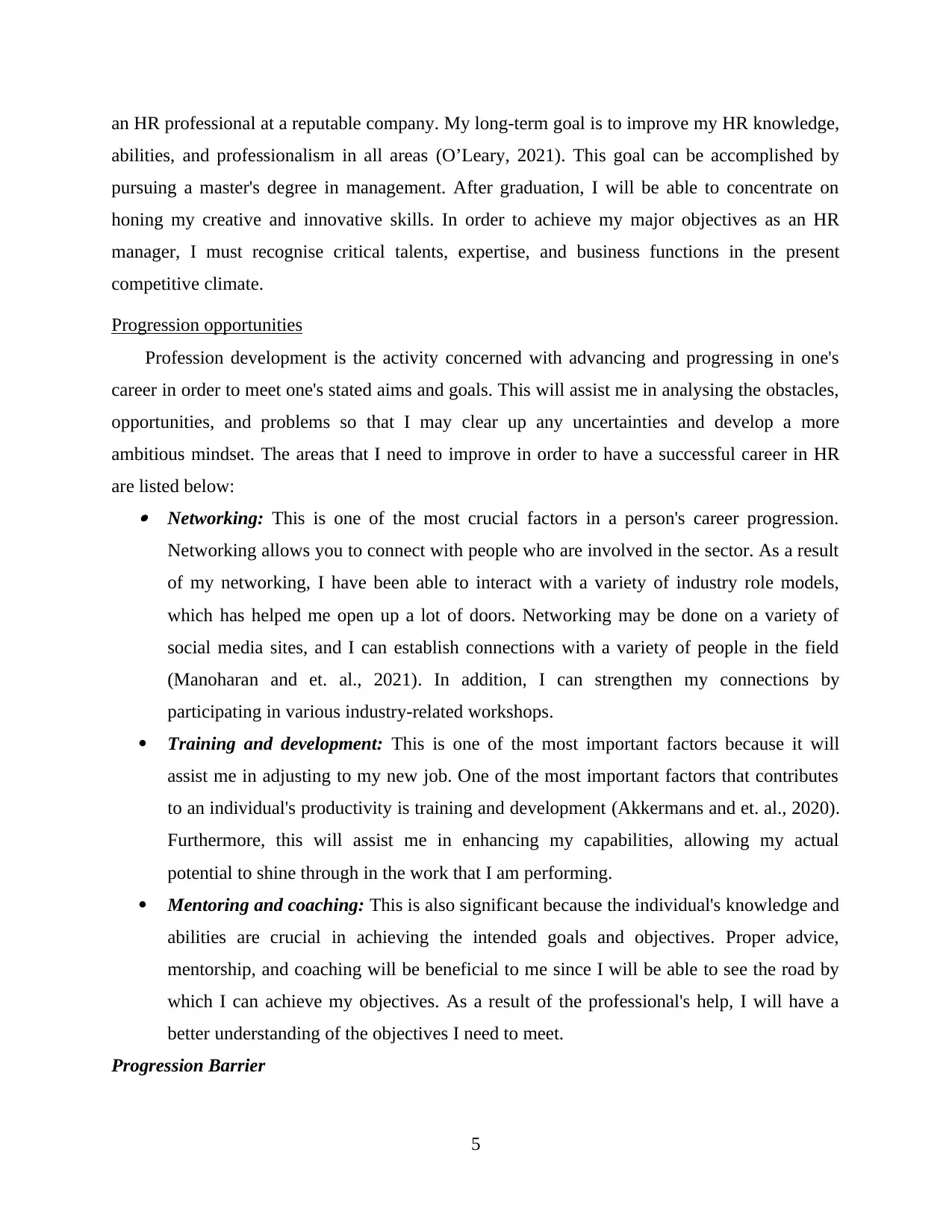
an HR professional at a reputable company. My long-term goal is to improve my HR knowledge,
abilities, and professionalism in all areas (O’Leary, 2021). This goal can be accomplished by
pursuing a master's degree in management. After graduation, I will be able to concentrate on
honing my creative and innovative skills. In order to achieve my major objectives as an HR
manager, I must recognise critical talents, expertise, and business functions in the present
competitive climate.
Progression opportunities
Profession development is the activity concerned with advancing and progressing in one's
career in order to meet one's stated aims and goals. This will assist me in analysing the obstacles,
opportunities, and problems so that I may clear up any uncertainties and develop a more
ambitious mindset. The areas that I need to improve in order to have a successful career in HR
are listed below: Networking: This is one of the most crucial factors in a person's career progression.
Networking allows you to connect with people who are involved in the sector. As a result
of my networking, I have been able to interact with a variety of industry role models,
which has helped me open up a lot of doors. Networking may be done on a variety of
social media sites, and I can establish connections with a variety of people in the field
(Manoharan and et. al., 2021). In addition, I can strengthen my connections by
participating in various industry-related workshops.
Training and development: This is one of the most important factors because it will
assist me in adjusting to my new job. One of the most important factors that contributes
to an individual's productivity is training and development (Akkermans and et. al., 2020).
Furthermore, this will assist me in enhancing my capabilities, allowing my actual
potential to shine through in the work that I am performing.
Mentoring and coaching: This is also significant because the individual's knowledge and
abilities are crucial in achieving the intended goals and objectives. Proper advice,
mentorship, and coaching will be beneficial to me since I will be able to see the road by
which I can achieve my objectives. As a result of the professional's help, I will have a
better understanding of the objectives I need to meet.
Progression Barrier
5
abilities, and professionalism in all areas (O’Leary, 2021). This goal can be accomplished by
pursuing a master's degree in management. After graduation, I will be able to concentrate on
honing my creative and innovative skills. In order to achieve my major objectives as an HR
manager, I must recognise critical talents, expertise, and business functions in the present
competitive climate.
Progression opportunities
Profession development is the activity concerned with advancing and progressing in one's
career in order to meet one's stated aims and goals. This will assist me in analysing the obstacles,
opportunities, and problems so that I may clear up any uncertainties and develop a more
ambitious mindset. The areas that I need to improve in order to have a successful career in HR
are listed below: Networking: This is one of the most crucial factors in a person's career progression.
Networking allows you to connect with people who are involved in the sector. As a result
of my networking, I have been able to interact with a variety of industry role models,
which has helped me open up a lot of doors. Networking may be done on a variety of
social media sites, and I can establish connections with a variety of people in the field
(Manoharan and et. al., 2021). In addition, I can strengthen my connections by
participating in various industry-related workshops.
Training and development: This is one of the most important factors because it will
assist me in adjusting to my new job. One of the most important factors that contributes
to an individual's productivity is training and development (Akkermans and et. al., 2020).
Furthermore, this will assist me in enhancing my capabilities, allowing my actual
potential to shine through in the work that I am performing.
Mentoring and coaching: This is also significant because the individual's knowledge and
abilities are crucial in achieving the intended goals and objectives. Proper advice,
mentorship, and coaching will be beneficial to me since I will be able to see the road by
which I can achieve my objectives. As a result of the professional's help, I will have a
better understanding of the objectives I need to meet.
Progression Barrier
5
Paraphrase This Document
Need a fresh take? Get an instant paraphrase of this document with our AI Paraphraser
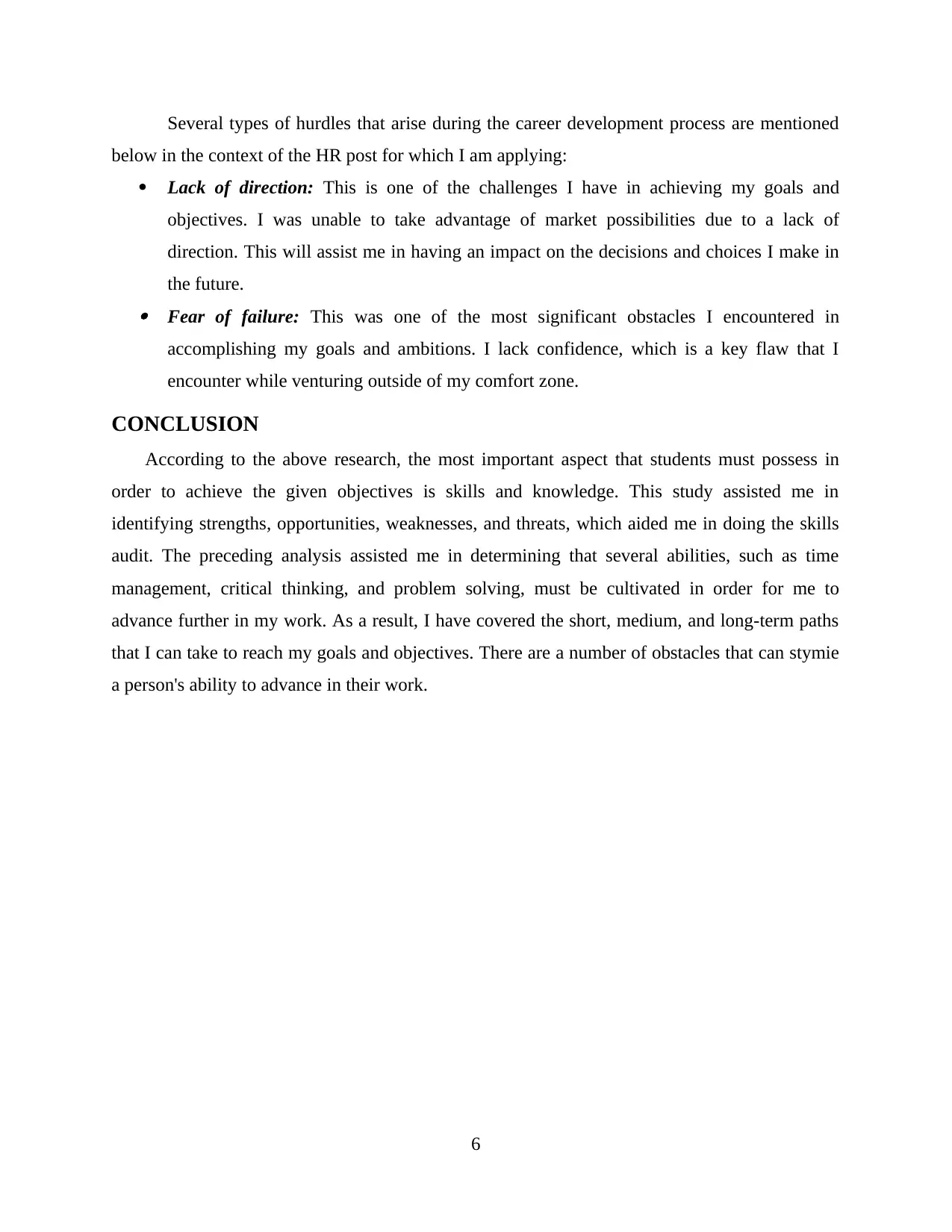
Several types of hurdles that arise during the career development process are mentioned
below in the context of the HR post for which I am applying:
Lack of direction: This is one of the challenges I have in achieving my goals and
objectives. I was unable to take advantage of market possibilities due to a lack of
direction. This will assist me in having an impact on the decisions and choices I make in
the future. Fear of failure: This was one of the most significant obstacles I encountered in
accomplishing my goals and ambitions. I lack confidence, which is a key flaw that I
encounter while venturing outside of my comfort zone.
CONCLUSION
According to the above research, the most important aspect that students must possess in
order to achieve the given objectives is skills and knowledge. This study assisted me in
identifying strengths, opportunities, weaknesses, and threats, which aided me in doing the skills
audit. The preceding analysis assisted me in determining that several abilities, such as time
management, critical thinking, and problem solving, must be cultivated in order for me to
advance further in my work. As a result, I have covered the short, medium, and long-term paths
that I can take to reach my goals and objectives. There are a number of obstacles that can stymie
a person's ability to advance in their work.
6
below in the context of the HR post for which I am applying:
Lack of direction: This is one of the challenges I have in achieving my goals and
objectives. I was unable to take advantage of market possibilities due to a lack of
direction. This will assist me in having an impact on the decisions and choices I make in
the future. Fear of failure: This was one of the most significant obstacles I encountered in
accomplishing my goals and ambitions. I lack confidence, which is a key flaw that I
encounter while venturing outside of my comfort zone.
CONCLUSION
According to the above research, the most important aspect that students must possess in
order to achieve the given objectives is skills and knowledge. This study assisted me in
identifying strengths, opportunities, weaknesses, and threats, which aided me in doing the skills
audit. The preceding analysis assisted me in determining that several abilities, such as time
management, critical thinking, and problem solving, must be cultivated in order for me to
advance further in my work. As a result, I have covered the short, medium, and long-term paths
that I can take to reach my goals and objectives. There are a number of obstacles that can stymie
a person's ability to advance in their work.
6
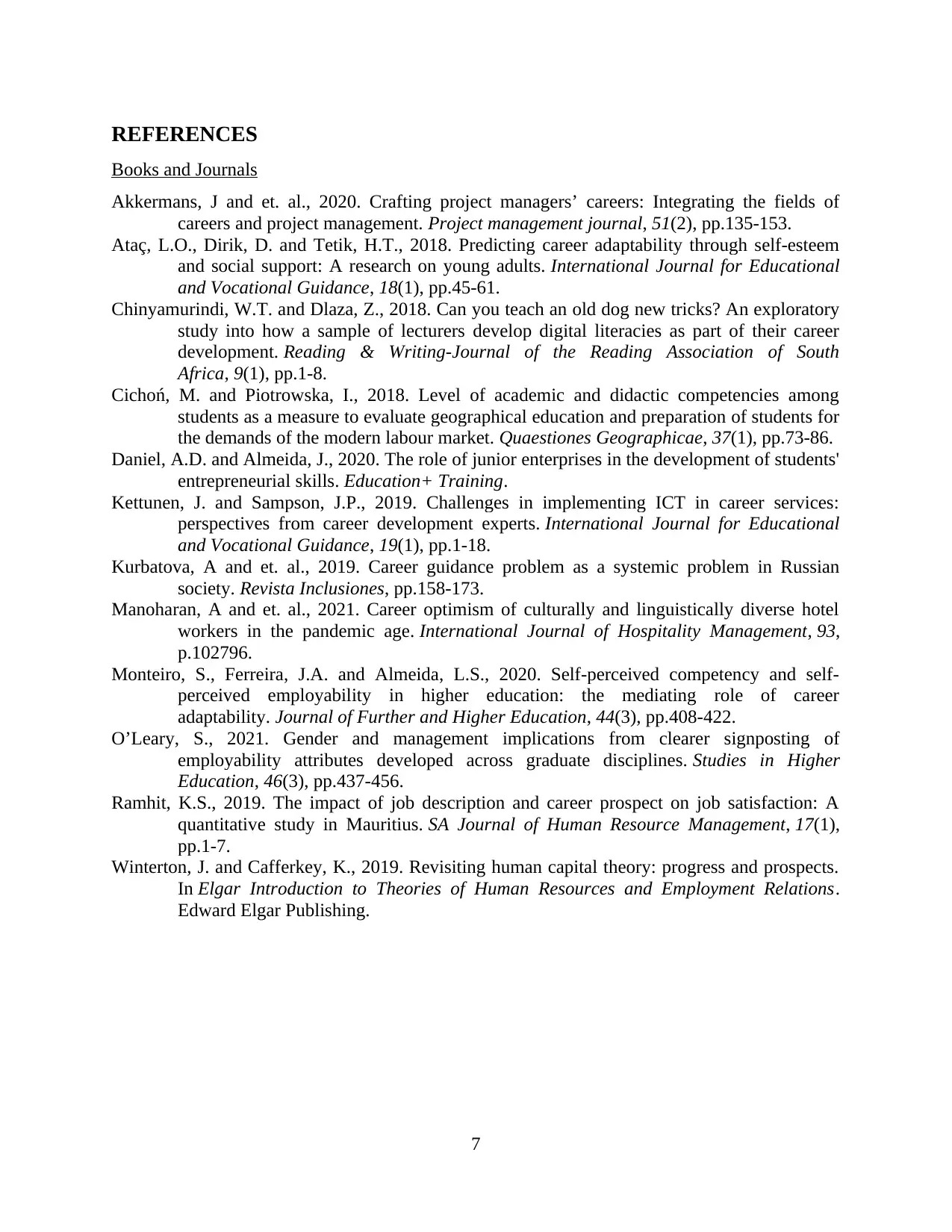
REFERENCES
Books and Journals
Akkermans, J and et. al., 2020. Crafting project managers’ careers: Integrating the fields of
careers and project management. Project management journal, 51(2), pp.135-153.
Ataç, L.O., Dirik, D. and Tetik, H.T., 2018. Predicting career adaptability through self-esteem
and social support: A research on young adults. International Journal for Educational
and Vocational Guidance, 18(1), pp.45-61.
Chinyamurindi, W.T. and Dlaza, Z., 2018. Can you teach an old dog new tricks? An exploratory
study into how a sample of lecturers develop digital literacies as part of their career
development. Reading & Writing-Journal of the Reading Association of South
Africa, 9(1), pp.1-8.
Cichoń, M. and Piotrowska, I., 2018. Level of academic and didactic competencies among
students as a measure to evaluate geographical education and preparation of students for
the demands of the modern labour market. Quaestiones Geographicae, 37(1), pp.73-86.
Daniel, A.D. and Almeida, J., 2020. The role of junior enterprises in the development of students'
entrepreneurial skills. Education+ Training.
Kettunen, J. and Sampson, J.P., 2019. Challenges in implementing ICT in career services:
perspectives from career development experts. International Journal for Educational
and Vocational Guidance, 19(1), pp.1-18.
Kurbatova, A and et. al., 2019. Career guidance problem as a systemic problem in Russian
society. Revista Inclusiones, pp.158-173.
Manoharan, A and et. al., 2021. Career optimism of culturally and linguistically diverse hotel
workers in the pandemic age. International Journal of Hospitality Management, 93,
p.102796.
Monteiro, S., Ferreira, J.A. and Almeida, L.S., 2020. Self-perceived competency and self-
perceived employability in higher education: the mediating role of career
adaptability. Journal of Further and Higher Education, 44(3), pp.408-422.
O’Leary, S., 2021. Gender and management implications from clearer signposting of
employability attributes developed across graduate disciplines. Studies in Higher
Education, 46(3), pp.437-456.
Ramhit, K.S., 2019. The impact of job description and career prospect on job satisfaction: A
quantitative study in Mauritius. SA Journal of Human Resource Management, 17(1),
pp.1-7.
Winterton, J. and Cafferkey, K., 2019. Revisiting human capital theory: progress and prospects.
In Elgar Introduction to Theories of Human Resources and Employment Relations.
Edward Elgar Publishing.
7
Books and Journals
Akkermans, J and et. al., 2020. Crafting project managers’ careers: Integrating the fields of
careers and project management. Project management journal, 51(2), pp.135-153.
Ataç, L.O., Dirik, D. and Tetik, H.T., 2018. Predicting career adaptability through self-esteem
and social support: A research on young adults. International Journal for Educational
and Vocational Guidance, 18(1), pp.45-61.
Chinyamurindi, W.T. and Dlaza, Z., 2018. Can you teach an old dog new tricks? An exploratory
study into how a sample of lecturers develop digital literacies as part of their career
development. Reading & Writing-Journal of the Reading Association of South
Africa, 9(1), pp.1-8.
Cichoń, M. and Piotrowska, I., 2018. Level of academic and didactic competencies among
students as a measure to evaluate geographical education and preparation of students for
the demands of the modern labour market. Quaestiones Geographicae, 37(1), pp.73-86.
Daniel, A.D. and Almeida, J., 2020. The role of junior enterprises in the development of students'
entrepreneurial skills. Education+ Training.
Kettunen, J. and Sampson, J.P., 2019. Challenges in implementing ICT in career services:
perspectives from career development experts. International Journal for Educational
and Vocational Guidance, 19(1), pp.1-18.
Kurbatova, A and et. al., 2019. Career guidance problem as a systemic problem in Russian
society. Revista Inclusiones, pp.158-173.
Manoharan, A and et. al., 2021. Career optimism of culturally and linguistically diverse hotel
workers in the pandemic age. International Journal of Hospitality Management, 93,
p.102796.
Monteiro, S., Ferreira, J.A. and Almeida, L.S., 2020. Self-perceived competency and self-
perceived employability in higher education: the mediating role of career
adaptability. Journal of Further and Higher Education, 44(3), pp.408-422.
O’Leary, S., 2021. Gender and management implications from clearer signposting of
employability attributes developed across graduate disciplines. Studies in Higher
Education, 46(3), pp.437-456.
Ramhit, K.S., 2019. The impact of job description and career prospect on job satisfaction: A
quantitative study in Mauritius. SA Journal of Human Resource Management, 17(1),
pp.1-7.
Winterton, J. and Cafferkey, K., 2019. Revisiting human capital theory: progress and prospects.
In Elgar Introduction to Theories of Human Resources and Employment Relations.
Edward Elgar Publishing.
7
⊘ This is a preview!⊘
Do you want full access?
Subscribe today to unlock all pages.

Trusted by 1+ million students worldwide

8
1 out of 10
Related Documents
Your All-in-One AI-Powered Toolkit for Academic Success.
+13062052269
info@desklib.com
Available 24*7 on WhatsApp / Email
![[object Object]](/_next/static/media/star-bottom.7253800d.svg)
Unlock your academic potential
Copyright © 2020–2026 A2Z Services. All Rights Reserved. Developed and managed by ZUCOL.





